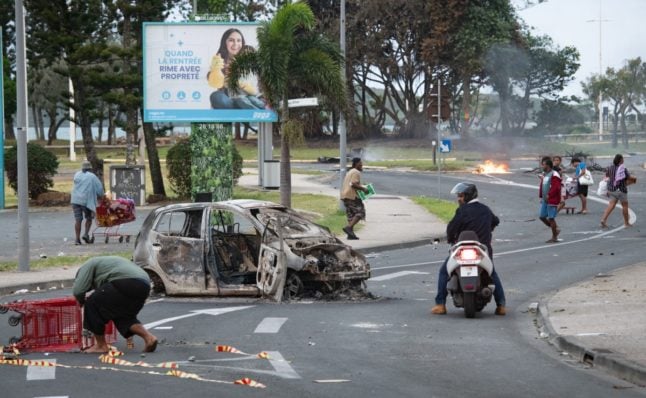The action, which comes as French farmers protest across the country, is the latest in a string of similar attacks against artworks to demand more action to protect the planet.
Two women on Sunday morning flung streams of orange soup onto the glass protecting the smiling lady to gasps from the crowd in the French capital’s Louvre museum, according to an AFP journalist at the scene.
“What is more important? Art or the right to healthy and sustainable food,” the activists asked, standing in front of the painting and speaking in turn. “Your agricultural system is sick. Our farmers are dying at work,” they said, before security staff evacuated the room.
A police source said both activists had been detained. The Louvre museum said the women had hidden the pumpkin soup in a coffee thermos.
Small quantities of food are allowed inside the museum, though eating is not allowed in the exhibition rooms.
The museum said the artwork had suffered “no damage”, and the room housing the masterpiece had re-opened to the public after closing for around an hour.
‘Civil resistance’
A group called Riposte Alimentaire (“Food counterattack”) claimed responsibility for the stunt. They said the soup throwing marked the “start of a campaign of civil
resistance with the clear demand… of the social security of sustainable food”.
They referred to a survey of 996 people last year by the Ipsos polling group that found that one in three French people were not always able to afford enough healthy food for three meals a day.
Member Till Van Elst said the group wanted the state to allow people to buy selected food items at reduced rates through a specialised social security card. Under the scheme, democratic assemblies would choose the food to be subsidised.
“We want citizens to really be able to… decide what is in their plates,” he told AFP.
Culture Minister Rachida Dati criticised the soup attack. “The Mona Lisa, as our heritage, belongs to future generations. No cause can justify targeting it,” she wrote on X, formerly Twitter.
La Joconde, comme notre patrimoine, appartient aux générations futures.
Aucune cause ne peut justifier qu’il soit pris pour cible !
J’adresse tout mon soutien aux personnels du @museeLouvre.
— Rachida Dati ن (@datirachida) January 28, 2024
Sunday’s action comes as French farmers have been protesting for days to demand better pay, taxes and regulations. The government has been trying to keep discontent among the agricultural workers from spreading months ahead of European Parliament elections, which are seen as a key test for President Emmanuel Macron’s government.
Prime Minister Gabriel Attal on Sunday scrambled to announce new measures as some farmers threatened to block roads into the capital on Monday.
READ ALSO: French PM to visit farm as agricultural unions vow Paris ‘siege’
Custard pie
The action at the museum follows a series of such stunts by climate activists against world-famous paintings to demand more action to phase out fossil fuels and prevent global warming.
In October 2022, two activists from the Just Stop Oil group grabbed headlines when they splashed tomato soup over the glass protecting Dutch artist Vincent van Gogh’s “Sunflowers” at the National Gallery in London.
They complained that art lovers were more concerned with paintings than the planet.
The “Mona Lisa” has been attacked several times before.
A man threw a custard pie at her in May 2022, also saying artists were not focusing enough on “the planet”. Her thick glass casing ensured she came to no harm.
She has been behind glass since a Bolivian man threw a rock at her in December 1956, damaging her left elbow.
The glass was made bulletproof in 2005.
In 2009, a woman threw an empty teacup at the painting, which slightly scratched the case.



 Please whitelist us to continue reading.
Please whitelist us to continue reading.
Member comments